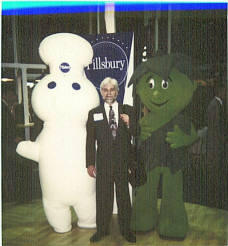Breaking News!
Woodward Said To Be Jumping To The New York Times
Post Won't Match Freedom To Sit On Stories; Keller Says Watergate Ace "Under No Pressure" To Break News
The Garlic has learned that The New York Times is close to wooing away from The Washington Post, star reporter and author, Bob Woodward, secretly courting him after the disclosure he sat on information of receiving Valerie Plame's name over two-years ago.
"It's rare when you can find," says Bill Keller, 'Times' Executive Editor, "that big of a reporter who has such a nose for when to bury a story, how to hold back blockbusting news. We're very lucky we can welcome him to the paper."
Keller went on to say that Woodward would be "under no pressure" to break any major stories.
"He can take his time. We don't want him to push the buttons too early."
Keller added that "with Judy {Miller} gone, we need another White House lackey, we've gone too long without one."
Last month Woodward had come under heavy criticism, from both his own colleagues and the media overall, for not informing his editor that he was given the name of Valerie Plame, the now former undercover CIA Agent that is at the center of a Leak Investigation by Special Prosecutor Patrick Fitzgerald that, to-date, has resulted in the indictment of Vice President Dick Cheney's Chief of Staff, Lewis 'Scooter" Libby.
Woodward initially indicated that it was is habit of keeping secrets, and a fear of being subpoenaed, that prevented him of disclosing the information to his paper's editors. Despite this, Woodward made numerous appearances on cable television news programs, making comments and observations on the leak case and characterizing it as something that won't amount to much
Woodward later said that the reason he didn't write about the Plame Case because most of the Pulitzer Prize-winning work had already been done by other reporters and that "I didn't have a good feel for it … I also didn't have a secret, high-level, FBI source that could give me leads, and that I could confirm leads with."
It was only after November 3rd, when Prosecutor Fitzgerald requested Woodward to testify before the Grand Jury, that Woodward advised his editor.
Washington Post Executive Editor Leonard Downie Jr. admitted that his most famous employee had "made a mistake."
"He still should have come forward, which he now admits. We should have had that conversation. . . . I'm concerned that people will get a mis-impression about Bob's value to the newspaper and our readers because of this one instance in which he should have told us sooner."
Downie indicate that he has been aware of The New York Times talking with Woodward, courting him.
"We made an offer to Bob, but there's no way we could match allowing him to sit on any more stories."
It was rumored last month that Woodward may join the White House staff, who had put out a RFP seeking quality, talented writers to assist the Administration in spinning their stories.
The New York Times is currently under criticism, after it was disclosed that the newspaper sat on the story of President Bush's ordering of secret wiretaps of American citizens for nearly a year.
'Times reporters met with both current and former National Security Agency and other government officials, all who were granted anonymity due to the classified nature of the program. All had concerns about the operation's legality and oversight.
According to their own reporting, James Risen and Eric Lichtblau indicated that "the White House asked The New York Times not to publish this article, arguing that it could jeopardize continuing investigations and alert would-be terrorists that they might be under scrutiny. After meeting with senior administration officials to hear their concerns, the newspaper delayed publication for a year to conduct additional reporting. Some information that administration officials argued could be useful to terrorists has been omitted."
In a statement last Friday, Keller wrote that when "the Administration argued stronglythat writing about this eavesdropping program would give terrorists clues about the vulnerability of their communications and would deprive the government of an effective tool for the protection of the country's security."
"Officials also assured senior editors of the Times that a variety of legal checks had been imposed that satisfied everyone involved that the program raised no legal questions," Keller continued. "As we have done before in rare instances when faced with a convincing national security argument, we agreed not to publish at that time."
Keller added that the paper satisfied itself through more reporting that it could write the story without exposing "any intelligence-gathering methods or capabilities that are not already on the public record."
When contact by The Garlic, Keller refused to say if The New York Times was sitting on any additional stories, or if they intend to hold back on news in 2006.
"I really can't say," offered Keller, "As to next year, some of that will be up to Bob."
Woodward, when reached for comment, refused to confirm or deny his moving over to The New York Times. When asked about 'the Times' holding back on the wiretapping story, Woodward offered'
"I think that was legitimate, there certainly was a compelling reason to take that action … I applaud their boldness … I only wish that I was the one sitting on it, I've always wanted one of my books serialized in The New York Times … That would be something, for sure …" The White House disclosed today, that in addition to conducting secret wiretaps on American citizens, they also have contracted psychics in their efforts to gleam information on terrorists and their activitiies
The White House disclosed today, that in addition to conducting secret wiretaps on American citizens, they also have contracted psychics in their efforts to gleam information on terrorists and their activitiies
Tuesday, December 20, 2005
Tuesday 20 December 2005
Subscribe to:
Post Comments (Atom)









































No comments:
Post a Comment